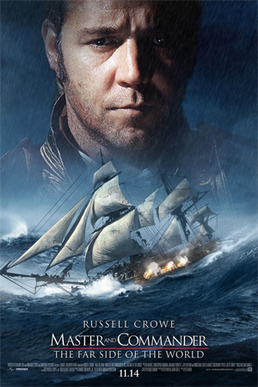Remember a few years ago when Russell Crowe was in Master and Commander, that really awesome movie about a British warship that had an ending that was perfectly poised for a sequel? I'm really disappointed a sequel hasn't happened. I guess it's still possible, though unlikely. Hollywood seems preoccupied with other stuff now.
I got to thinking about it after I read this blog about the sinking of the Essex, which partially inspired Moby Dick and is one of the most amazing survival stories in modern history. I have been fascinated by anything related to Moby Dick and 19th century seafaring ever since I was a kid. My dad knows all about whales; he studied whales in his free time before I was born and I'm convinced that the only person who could tell you more about whales would be an actual marine biologist. Moby Dick loomed large in my house growing up. My dad references it more than any other literary work. You have to know it to keep up with him. In addition to being an amateur cetologist, dad also has encyclopedic knowledge of 19th century whaling and naval warfare. I think he enjoyed the "nuts and bolts" passages in Moby Dick more than anyone else who has ever read it. Let's be honest, most of us skipped over those parts, if we made it through the book at all.
I was really happy to see that blog from the Smithsonian. There are actually two true stories that served as Herman Melville's main inspiration when he was writing Moby Dick. The character of Moby Dick (yep, he's a character) was inspired by a real-life albino whale named Mocha Dick who was famous for his large size and many skirmishes with whaleships. This whale was a legend. When he was finally killed, his body yielded over 100 barrels of oil and there were numerous harpoons stuck in him from previous chase attempts. All of these traits would make their way into Melville's book.
The other true story that inspired Moby Dick was that of the Essex. The Essex was an American whaleship that was rammed and sunk by a sperm whale in 1820. Melville folded the idea of a whale ramming a ship into his book, but he didn't include what happened after, which was even more unbelievable: stranded at just about the most remote possible location on earth (more than 1200 miles from the nearest island), the sailors set out in open whaleboats to find land. Eight of them survived the epic ordeal--3 months on the open sea, starvation, cannibalism, the works--and all of them, yes ALL returned to sea after they got back to New England. Can you believe they recovered and went back to sea? Well, they didn't all totally recover. The captain of the Essex would survive two MORE shipwrecks before backers finally deemed him an unlucky "Jonah" and he was forced to spend the rest of his life on land. The first mate hoarded food in his attic later in life and eventually had to be put in an institution.
Whaleboat like the ones the Essex crew used
There is a fantastic book about the Essex by Nathaniel Philbrick that has all the gory details of what went down. This book is on my short list of "books I read in a single day." I couldn't put it down. It is well worth your time.
I wish Hollywood would make some more good movies about ships. The 1956 version of Moby Dick is really good, although not many people have seen it because it was a commercial flop. Audiences couldn't handle Gregory Peck playing a villain (Captain Ahab). The story of the Essex could make a fantastic movie with the right director attached. And there needs to be a Master and Commander sequel.
If you're in the mood for other movies about ships: Mutiny on the Bounty (1935) is really good, is also based on a true story, and stars Clark Gable and Charles Laughton! I haven't seen the 1962 remake with Marlon Brando, so I can't comment on whether that one is worth your time or not.
Endurance: Shackleton's Incredible Voyage is another great book I couldn't put down that is about a true story of survival.


No comments:
Post a Comment